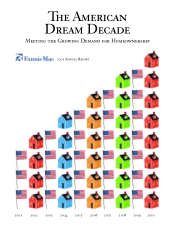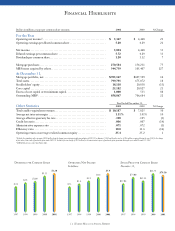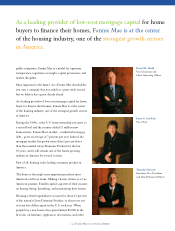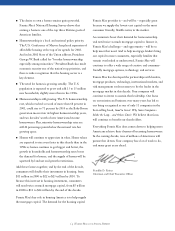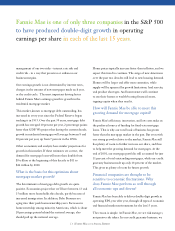Fannie Mae 2001 Annual Report Download - page 6
Download and view the complete annual report
Please find page 6 of the 2001 Fannie Mae annual report below. You can navigate through the pages in the report by either clicking on the pages listed below, or by using the keyword search tool below to find specific information within the annual report.
{ 4} Fannie Mae 2001 Annual Report
improvements. If they move into an older home, they’ll still
spend $6,500 in the first year making it better. Altogether,
consumers spent $1.7 trillion in 2001 on housing-related
goods and services. That’s more than they spent on food,
clothing, and education combined.
On top of being the leading consumer product, housing
also is the leading consumer investment in America.
The average family invests more in their homes than they
invest in the stock market, money market funds, or their
retirement savings plans. There is a good reason for that.
Housing is a safe, leveraged investment – the only
leveraged investment available to most families – and it is
one of the best returning investments to make. Even after
the longest, strongest bull market in history, over the last 10
years, the average-priced home earned nearly twice the value
of the average stock portfolio – $44,000 versus $23,000.
In a recent poll, 39 percent of Americans said they believe
that real estate is the best investment they can make, while
only 20 percent picked the stock market. While consumers
consider stock market gains to be volatile and ephemeral,
they regard home value gains as more stable and
permanent. Most importantly, unlike others, housing is
an investment in which you can live, raise a family, and
put down stakes in a community.
Because housing is the leading consumer product and
investment, it also is one of the key economic drivers
in America.
For example, in 2001, the economy suffered its worst year
in a decade. At the same time, housing had one of its best
years in history. All told, Americans bought over six million
new and existing homes last year, setting a new record.
This record year for housing, in turn, was good for the
economy. During the home refinancing boom of 2001,
consumers withdrew about $80 billion in equity wealth
from their homes, an average of $23,000 per homeowner
who refinanced. With this extra wealth, households reduced
their revolving debt and pumped $50 billion in spending
into the economy, providing a larger economic stimulus
than the federal tax rebate.
The boost from housing helps to explain why – even
though key industries suffered double-digit declines – the
economy overall actually rose slightly. Without the boost
from housing, the recession would have started sooner,
lasted longer, and been more severe. It is estimated that if
housing had slipped as it usually does in a recession, the
decline in GDP would have been five times worse, and
350,000 more Americans would have lost their jobs.
The 1990s was one of the best decades in history for
housing, and this decade began with one of the single best
years ever. But the best is yet to come. According to the
demographic and economic predictors of housing needs,
a sustained surge in consumer spending and investment in
homes will make housing a strong growth market and
powerful economic driver for at least the rest of the decade.
There are good reasons why.
The 1990s was one of the best decades in history for
housing, and this decade began with one of the single
best years ever. But the best is yet to come.

